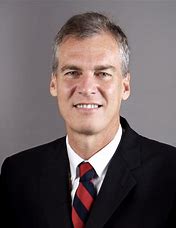Mr. Parkinson Goes to Washington. His Current Task is to Cover Up Corporate Responsibility for Massive Loss of Life Due to COVID

When Kathleen Sibelius was appointed HHS Secretary by President Obama, her Lieutenant Governor, Mark Parkinson, became governor. His first major act was to nullify one of his predecessor’s last acts. Governor Sibelius had denied a permit for a dirty, hyper-polluting, fossil fuel, power plant in Southwest Kansas. Parkinson reversed her decision and granted the permit. That was probably Parkinson’s only significant act as governor. He finished out what would have been Sibelius’s term and immediately left for a high paying gig in Washington, D.C. – as CEO of the American Health Care Association (AHCA).
The AHCA lobbies on behalf of its nursing home corporation members. According to the organization’s 2019 IRS 990, it has annual revenues of $40 million – most of which is derived from member dues. Parkinson’s 2019 compensation was reported on the 990 as $2.5 million. (https://projects.propublica.org/nonprofits/organizations/530260105).
These days, Parkinson is busy converting AHCA corporate members from negligent providers of care to victims of COVID-19 by pleading hardship on their behalf for what could be 200,000 deaths in the so-called “nursing homes” of America. In the last few days, he was quoted in Skilled Nursing News bemoaning the poor financial outlook for the nursing home industry(Parkinson: Nursing Homes’ Financial, Operational Recovery ‘Completely Tied to Visitation’ – Skilled Nursing News). As our past and current posts regarding earnings of publicly listed provider corporations have demonstrated and will likely continue to demonstrate, long-term care providers are in fact doing quite well.
The Rights of Nursing Home Patients and their Families are up against AHCA Corporate Members & Their Deep Pockets
Make no mistake about it, the AHCA, with affiliates in all 50 states, swings far, far, more weight in Washington and state capitols than well-meaning advocacy and activist groups could ever hope for. Indeed, the power relationship between the industry and advocates is asymmetrical. That explains why regulation is weak and quality of care remains low.
For instance, according to Section B. of the AHCA IRS 990 (displayed below), $3,197,201 alone was spent on software and public relations/lobbying firms in Washington, D.C. The software helps link 50 state chapters and coordinate campaign and lobbying activities. The $2 million plus expenditure for “public affairs,” “audio visual solutions,” “communications,” and so forth in a single year is a component of the industry’s propaganda juggernaut. Much of the rest of the $40 million is spent on Democratic and Republic governor’s associations and other purchases of political influence.

What Does $40 Million Buy the Nursing Home Industry in One Year?
Immense amounts of cash, decades of lobbying expertise, and a high paid staff can guide legislation and regulation in a direction that benefits corporations at the expense of patients, families, and communities. Stated differently, the AHCA is a well-oiled propaganda machine.
AHCA framing and narratives have been effective in creating a Panglossian viewpoint among the public, media, and even advocates. Although it is common to hear negative comments about the industry such as it is “greedy,” “puts profits above people,” and other such disparaging remarks, a psychologically complex set of beliefs neutralize this disdain. Industry propaganda has undermined the public’s suspicion that greedy industrialists are pocketing excess amounts of Medicare and Medicaid funds through unjustified cost cutting.
The gargantuan amount of PR money spent by the AHCA and expertise in manipulating public opinion has instilled a subliminal belief among a wide swath of the public. Their narrative is that the nursing home system is the best there is in the best of all possible worlds. Stated differently, the industry would have you believe that Medicare and Medicaid reimbursements are too paltry for them provide better care and remain in business. Their lobbyists and PR mavens brilliantly induce the belief that net earnings are so thin that humane care is financially out of reach. This is a scurrilous lie.
By Dave Kingsley
